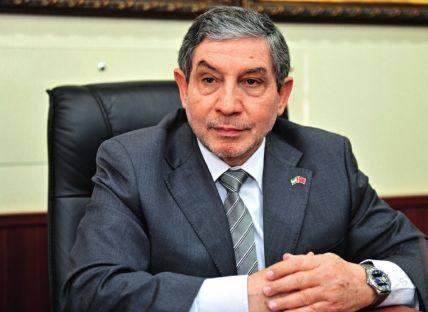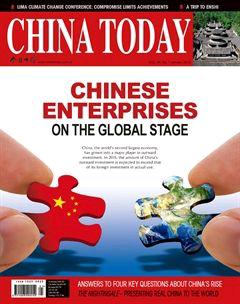Proud of Our Genuine Friendship with China
By staff reporter CHEN JING
THIRTY years after the establishment of diplo- matic relations between the Peoples Republic of China and the United Arab Emirates, the two countries are witnessing monumental, across-theboard developments. On this occasion, China Today spoke to UAE Ambassador to China Omar Al Bitar to learn about the past and prospects of friendly relations between the two countries.
China Today: The relationship between China and the UAE is one characterized by friendship and fruitful cooperation. What have been the highlights of the development of bilateral relations over the past 30 years?
Ambassador Al Bitar: The relationship between Arabs and Chinese people date back thousands of years to the Silk Road, so when talking about modern relations between the UAE and China we need to do so against their historical framework. The evolution of the two countriesrelationship was channeled via the commercial and cultural Silk Road, which linked our peoples.
The Arab region occupies a central position in the world. It was important for Chinas crossing to the West and remains so today. The rise of Islam in the Arab region further contributed to the strengthening of this relationship, as Muslim traders arrived in China. Historical evidence proves the deep, booming and developed cultural and human relations that were fostered, based on peace and love. Therefore, todays strategy cited by Chinese President Xi Jinping to create “one belt and one road” is a significant continuation of the path of the Silk Road and Sino-Arab relations.
Diplomatic relations between China and the UAE were established on November 1, 1984, so 2014 marked 30 years of modern relations. To talk about the highlights of our countries relationship involves sifting through decades of important events, starting with the initiation of relations between the UAE and China led by the late Sheikh Zayed bin Sultan Al Nahyan, who recognized the importance of China and the importance of building relations with China. We in the UAE have a deep respect and love for China and the Chinese people. Our relations are burgeoning in all areas and have been consolidated via numerous visits to China by our top leaders.
China Today: Economic and trade ties between the two countries are just as important as political and diplomatic relations. Can you expound on how cooperation in trade and economics is benefiting both sides?
Ambassador Al Bitar: From 1998 to the end of 2013, so within 15 years, trade between the two countries increased 31-fold. In my opinion, this is a distinct indicator of the success of our economic relations. The UAE is the first destination in the Middle East for Chinese tourists thanks to the advantages of entertainment, shopping and fun experiences, and the number of Chinese visitors is increasing. More and more Emiratis are visiting China, too.
I would like to talk about politics here because political ideologies provide the general framework of all these developments – if there were no political consensus between the two sides to ensure the smooth running of economic relations, the partnership would risk collapse. There is a saying, “capital is coward,” meaning investment normally steers away from zones of conflict. But mutual trust between China and the UAE enhances the relations in all fields. China has opened banks in the UAE on the basis of trust and UAE banks will open branches in China in the near future.
The UAE, despite its small size, has come to occupy a prominent position in the international arena. Emiratis highly appreciate China. We are eager to learn from China, and China also wants to learn from the UAE. We believe that we will be able to face the challenges of the future together. One figure in particular sums up the interdependence of the two countries, namely, the number of weekly flights – of passengers and cargo – between the UAE and China, which stands at 130. This number ranks high in the world and illustrates the depth of our relations.
China Today: The UAE is achieving a high rate of development, which is drawing the attention of the world. The UAE government is seeking to further open up to the world to take advantage of others experiences to advance social development and improve peoples living standards. What are the main goals of the UAE government, and how do you view Chinas experience of reform and opening-up, and the results achieved?
Ambassador Al Bitar: To answer that we must first look at what is behind this rapid outstanding development. The United Arab Emirates is an important station towards the Middle East and the whole Arab region because of its geographical location: If we draw a circle around the UAE, we find that the distances from major cities in Asia, Europe and Africa to the UAE are equal. Emiratis have long acknowledged the UAEs geographical advantage; it has played an important role in naval and land routes throughout history.
Our leadership, therefore, pays great attention to developing the countrys infrastructure, which currently ranks sixth in the world and may be in third place by 2020, and thus provides a solid base for economic development. This serves the UAE and its partners: We have built the worlds largest airports, ports and dry docks, and offer all of these outstanding facilities for any trade partner of this country. Our international airports, for example, compete with those around the world. Each year more than 80 million passengers use them and all major airlines in the world have offices in the UAE. It is an essential transit hub for passengers and cargo bound for any direction, but particularly those going to and from the three converged continents – Africa, Asia and Europe.
The Emirates has also realized the importance of the service sector, as this field becomes more distinctive in our economy and exceeds that of some developed countries in the world. The service industries in which the Emirates excel include hotels, telecommunications and transportation.
There are similarities between China and the UAE: both provide a safe situation for all residents, whether they are citizens or expatriates. There are more than 200 nationalities living in the UAE, with various cultures and religions. They enjoy the same rights and privileges as nationals, without discrimination, and that is thanks to the faith and beliefs of our country. Our leaderships policies are based on coexistence and tolerance as well as charity, humanity and communication, values that we have translated into laws and regulations.
We are a hospitable people, like the Chinese, and we welcome guests from afar. Four decades ago, the UAE was an impoverished country. Now, we are stronger and more stable. Moving forward, we must work together to face the challenges of the future. Humankind is made up of different cultures, customs and faiths, but as long as there is peace, and love prevails, the people of this global village can live a carefree life.
Today, we enjoy a stable financial system, and we welcome traders from all over the world to do business in the UAE, attracted by its sound laws and security. Among our international business partners is China. In 2013, Chinese direct investment in the UAE topped US $2 billion, and there were more than 5,000 Chinese companies registered in the UAE working in all areas. The UAE is the second largest trade partner of China among Arab countries. But if we exclude oil, it is the first and primary destination for Chinese goods in the region.
China Today: What about social, cultural, educational and youth exchanges between the two countries?
Ambassador Al Bitar: The visit by the late Sheikh Zayed Bin Sultan Al Nahyan to China in 1990 was significant in this regard. One of its achievements was the initiative to establish the Sheikh Zayed Center for Arabic language and Islamic studies at the Beijing Foreign Studies University, which was an important milestone in promoting cultural exchanges.
In 2014, I attended the opening of the new school year at the university. The center houses the universitys faculty of Arabic and we are proud of the initiative because it is a pioneer in encouraging language studies and hence promoting communication between the two cultures, building a cultural bridge between the Chinese and Arabs. Equally, there are two Confucius institutes in the UAE, one in Abu Dhabi and the other in Dubai. The UAE is home to the largest Chinese community in the Middle East. Chinese people live all over the country, working in different fields in safety, peace and happiness.
China Today: What is the significance of the friendly ties between China and the UAE to their shared interests? And what impact do they have on international affairs?
Ambassador Al Bitar: The UAE is a member of the League of Arab States, which comprises 22 countries, and there is also the China-Arab Cooperation Forum, in which we are very active. The UAE has hosted multiple events of this forum, such as a seminar on Sino-Arab relations and dialogues between Chinese and Arab civilizations in Abu Dhabi in 2011 and a business conference in Sharjah in 2012, opening up ample opportunities for bilateral and multilateral cooperation.
Our cooperation is on many levels. We are developing relations with China within the framework of the Gulf Cooperation Council, the League of Arab States and the United Nations. We support each other on global issues and share Chinas policies of peaceful coexistence.
Looking to the future, I believe we are moving towards an even stronger bond that will enhance the achievement of our common goals, interests and hopes. Today, the trade volume between our two countries is US $46 billion, and I think that by the end of 2015, it will reach US $60 billion.
China Today: Do you have some words for our readers?
Ambassador Al Bitar: I am grateful for this opportunity to share with your readers some facts about our policies and about the China-UAE relationship, and I am proud that our two countries are genuine friends. I would like to congratulate China and the UAE on the 30th anniversary of diplomatic relations and wish the two countries all the progress and prosperity with which to serve humanity, before serving their own interests.

